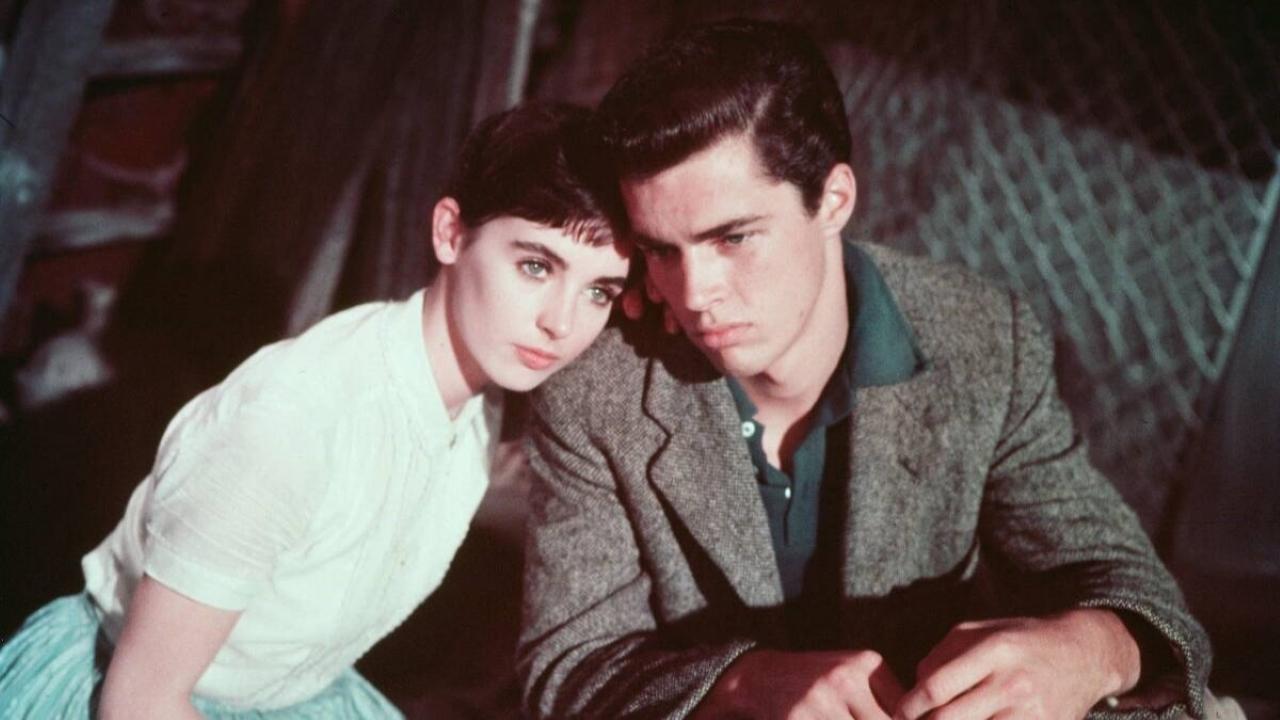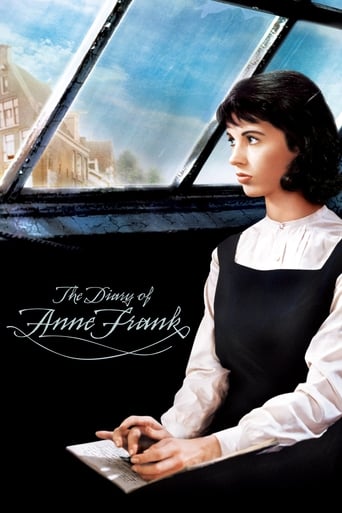

Wow! Such a good movie.
... View MoreThis movie is the proof that the world is becoming a sick and dumb place
... View MoreStrong acting helps the film overcome an uncertain premise and create characters that hold our attention absolutely.
... View MoreThis is a small, humorous movie in some ways, but it has a huge heart. What a nice experience.
... View MoreIt must be one of hollywoods travesties that Milly wasn't recognised for her fantastic performance in this movie . It proves that these Oscars were handed out to favourable characters rather than based on actual acting in the given movie Considering this was her first big acting role. Milly completely makes this film worthwhile and believable . To the fools in the academy that never recognised her superb performance back in 59' "Quack Quack"
... View MoreThis movie was the first film ever made that dealt with the Holocaust, and is one of the best films in its genre along with Steven Spielberg's "Schindler's List" (1993), and Quentin Tarantino's "Inglourious Basterds" (2009). The film is also the only Hollywood film to deal with the two years where Anne Frank her family, and two other families are hiding in an attic from the Nazis. At the time the film was being made George Stevens who directed and produced the movie took a big gamble with casting an unknown actress in the title role, that actress was Millie Perkins. Despite being 21 years old when she was making the movie Perkins shines in her film debut as Anne Frank a young teenage girl who writes a diary of the events that happen during her time hiding from the Nazis. During the film we get to know each of the characters thanks to a well-written script, and William Mellor's excellent cinematography. One thing that I've noticed while watching the movie was this movie was a more family oriented movie than any other Holocaust movie I've ever seen, and it was still effective. George Stevens was one of the most ambitious filmmakers of his generation along with other legendary directors like John Ford and Howard Hawks and Stevens' direction for this movie is no exception to his greatness as a filmmaker. Also I was also on the edge of my seat because of Alfred Newman's haunting and Oscar nominated score which I felt my hairs raising. Though movies set in different countries during World War II that were made during the "Golden Age" of Hollywood is that none of the actors use accents which made me feel like I was watching American Jews hiding from the Nazi army in Holland, thanks to mostly lackluster performances which is very disappointing for A George Stevens movie. Diane Baker is very good here as Anne's sister Margot, as well as an excellent supporting cast including Joseph Schildkraut (who won an Oscar for his performance in "The Life of Emile Zola") as Anne's father Otto, Shelley Winters won an undeserved Oscar for her performance as Mrs. Van Daan, Gusti Huber as Anne's mother, Lou Jacobi as Mr. Van Daan, Ed Wynn's Oscar nominated performance as Mr. Dussell I found to be annoying and mean spirited. Also Richard Beymer is also very good as the only child of the Van Daan family Peter who happens to be Anne's love interest. Though this is one of the finest films of 1959 it isn't a great film because I feel it would have been a much stronger and much more effective film if the actors had put more dedication and effort into their performances. But it was still emotionally effective as a movie.
... View MoreI just finished reading the diary of Anne Frank and was moved. As you probably already know, Anne Frank was a German-born Dutch Jewish girl who went into hiding with her family and another family during the Holocaust. The majority of the movie takes place in their hiding spot. There are also added post-war scenes at the beginning and end of the movie that Anne of course couldn't have written, because she didn't survive.I was curious to see this movie, which I had only seen two scenes of on TV- Anne not throwing away her yellow star because it's a Star of David, and Mr. Van Daan drawing fury for stealing food. Neither scene is from the actual diary. There's the rub- the best parts of this movie are lifted directly from the book, but what's added, changed or left out is no improvement. Anne's diary reads as good as fiction already, so I don't think there was much need to "dramatize" it. Some scenes- like the characters confessing their sins on D-Day- come close to sappy, and Anne never really reconciled with her mother. I also wasn't very impressed with the actress playing Anne in this film. By all means, see the movie- but don't see the movie instead of reading the real thing.
... View MoreA handful of minutes ago I finished watching for the first time "The Diary of Anne Frank", which is the second movie adaptation of this tear-jerking true story that I have seen. A handful of minutes ago, I also discovered that Miep Gies, the last survivor of the story of Anne Frank, passed away very recently (January 11, 2010). So from the combination of the emotional power I felt from the movie and the emotional strike I've just been dealt, I more than enthusiastically commit myself, though tired and wanting to sleep, to writing this review for a superb, very powerful film by the great George Stevens.For those not familiar with the story, Anne Frank was a Jewish girl whose family went into hiding with another family and a single man during the times of World War Two. For two years, they lived in the attic over the workshop of friends before they were discovered by Nazis and deported into concentration camps, from which only Anne Frank's father survived. Anne, however, kept a diary detailing her time in hiding. It was published, subsequently adapted into a play, and from that came this marvelous, emotionally powerful movie.George Stevens movie takes a daring move by telling us the outcome of the movie at the beginning. We are told what to look for and what to wait for, and most of the remaining three hour-running time is then dominated by a flashback. In it, we get a real sense of the mixed emotions the real Anne Frank and her companions would have felt. Optimism and pessimism jump about with changing circumstances and at times we are so hopeful that the characters will survive even though we know that they will be caught and all save Otto Frank, Anne's father, will die.Apart from the movie's success at pulling at our heart strings and changing tones from optimistic to pessimistic in an instant, it also scores high due to a remarkable ability to generate suspense. We know right from the start that they will be caught the suspense is waiting for it to happen. George Stevens' fabulous directing and use of silence and stress of sound really generates effective tension, allowing minute after minute to go by and our eyes refuse to leave the screen. The only regrets I have about Stevens' directing style is his trademark use of the camera being able to pass through walls and ceilings, which I have never found in any movie to be convincing. But in terms of the emotional scenes and just making an artistic movie, he succeeds with brilliance.Anne Frank is portrayed competently by Millie Perkins as a charismatic if somewhat eccentric young woman who dreams of a future she will never have the chance to strive for. Unfortunately, the only real weakness in the movie apart from its stretched running time is not Perkins' performance, but her character. The way Anne Frank is written, she actually comes off as a little dull. What we do get from her comes from Perkins' performance. However, this is made up by the supporting cast. Shelley Winters, who won the Oscar for Best Supporting Actress, is especially good in the picture as is Richard Beymer (whom you will remember as Tony from "West Side Story"), Ed Wynn, and Joseph Schildkraut who I think gives the best performance as Anne's father. These characters are all well-played and are well-rounded to get us to believe in them as human beings. If only the writers had stressed the presence of Anne with more than just dialogue, then we would have had a near-perfect film."The Diary of Anne Frank" is a superb, tautly-directed movie. There are some slow parts especially in the middle of the movie, but it is overall a very overwhelming film experience. The movie is more than fifty years old now and it has more power than a great many so-called tearjerkers that I've seen come out in recent years. The story of Anne Frank is an immortal tale and part of the reason why this movie tugs at our heart strings so powerfully is because we know it's true. This is one of those movies that keeps that in mind and uses it to an advantage rather than simply relying on that fact to save the day. It's a most commendable motion picture.
... View More